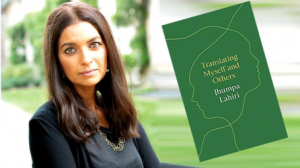Translating Yourself and Others
Translating Yourself and Others: A Reflective and Collaborative Translation Workshop Inspired by Jhumpa Lahiri
Moderated by: Nicole M Houser, Co-Director, Language and Social Justice Initiative, Associate Teaching Professor, English and Nela Navarro, Associate Teaching Professor, English, Language Engagement Project In-Service Coordinator
In her recent collection of essays, Translating Myself and Others, Jhumpa Lahiri reflects on how translation has affected practices of and identities as a writer, from her earliest memories to present day. In the Introduction of this work, Lahiri reflects, “A translation dilemma is among my earliest memories. I was five, seated at a large table with many other children in a kindergarten classroom. Making cards for Mother’s Day. Together we folded stiff sheets of white paper, and constructed and pasted pink crepe-pater roses with stems to the cover. The assistant teacher circled the table, spraying some perfume into each of our roses. Inside the card, we all had to handwrite the same message: ‘Dear Mom, happy Mother’s Day.’ This part of the project stymied me, given that my mother was not ‘Mom’ but ‘Ma.’ I was embarrassed to insert the Bengali term I used and knew her by—the one she recognized and responded to. I was also reluctant to resort to the English term, which sounded foreign to me, and would have certainly alienate, even offended her. The memory is still fresh, though I can no longer remember what I chose to write inside the card. Revisiting that dilemma now, in 2021, it occurs to me that it has just as much to do with the act of writing as it does with translation.
In this reflective and collaborative workshop, we invite you to reflect upon the earliest memories of translation and of translating yourself- situations and interactions that prompted your awareness of the choices one needs to make in communicating across cultures. This workshop is comprised of two 15-minute sessions: Session 1, “Translating Myself” will begin with a 15-minute free-write exercise in which participants write about their earliest memories of translating themselves and how these experiences have shaped them as translators and writers. In session 2, “Translating Others” participants will exchange their work from session 1 with a fellow participant and translate their work to the language(s) of their choice.
